第三讲 英语句子的功能分类 (1).
1句子的用途分类
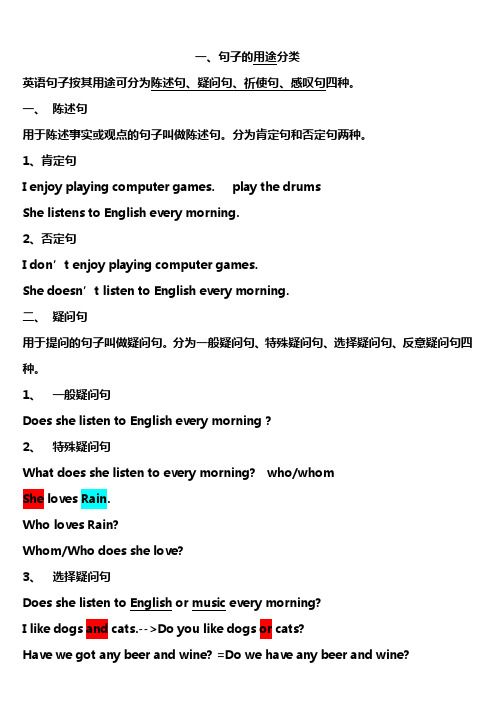
一、句子的用途分类英语句子按其用途可分为陈述句、疑问句、祈使句、感叹句四种。
一、陈述句用于陈述事实或观点的句子叫做陈述句。
分为肯定句和否定句两种。
1、肯定句I enjoy playing computer games. play the drumsShe listens to English every morning.2、否定句I don’t enjoy playing computer games.She doesn’t listen to English every morning.二、疑问句用于提问的句子叫做疑问句。
分为一般疑问句、特殊疑问句、选择疑问句、反意疑问句四种。
1、一般疑问句Does she listen to English every morning?2、特殊疑问句What does she listen to every morning? who/whomShe loves Rain.Who loves Rain?Whom/Who does she love?3、选择疑问句Does she listen to English or music every morning?I like dogs and cats.-->Do you like dogs or cats?Have we got any beer and wine? =Do we have any beer and wine?4、反意疑问句She listens to English every morning,doesn’t she?三、祈使句用于表示请求、命令、劝告、建议等的句子叫做祈使句。
祈使句的主语一般省略,但其隐含主语通常为you。
祈使句否定结构是在句首加don’t。
Look out/be careful/watch out! there's a car coming.Don’t open the door.四、感叹句用于表示喜怒哀乐等强烈感情的句子叫做感叹句。
英语各句子成分及说明
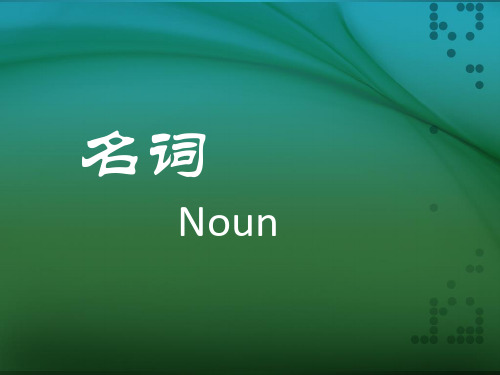
Noun
名词在句子中的作用
句子成分:英语句子成分分 为七种:主语、谓语、宾语、定语、 状语、表语、宾语补足语。
1、主语是句子所要说的人或事物。 通常用名词或代词担任。
如:I’m Miss Green.(我是格林小姐)
名词在句子中的作用
2、谓语动词说明主语的动作或状态。 主要由动词担任。 如:Jack cleans the room every day. (杰克每天打扫房间)
名词在句子中的作用
3、表语在系动词之后,说明主语 的身份或特征 通常由名词、代词或形容词担任。 如:My name is Ping ping .(我的 名字叫萍萍)
名词在句子中的作用
4、宾语表示及物动词的对象或结果 通常由名词或代词担任。 如:He can spell the word.(他能 拼这个词)
如:They usually keep thபைடு நூலகம்ir classroom clean.(他们通常让教室保持清洁) He often helps me do my lessons. (他常常帮我做功课)
名词在句子中的作用
5、定语修饰名词或代词, 通常由形容词、代词、数词等担任。 Shanghai is a big city .(上 海是个大城市)
名词在句子中的作用
6、状语用来修饰动词、形容词、副词, 通常由副词担任。 如:He works hard .(他工作努力)
名词在句子中的作用
7、宾语补足语用来说明宾语怎么样或 干什么 通常由形容词或动词充当
句子成分的分类及作用
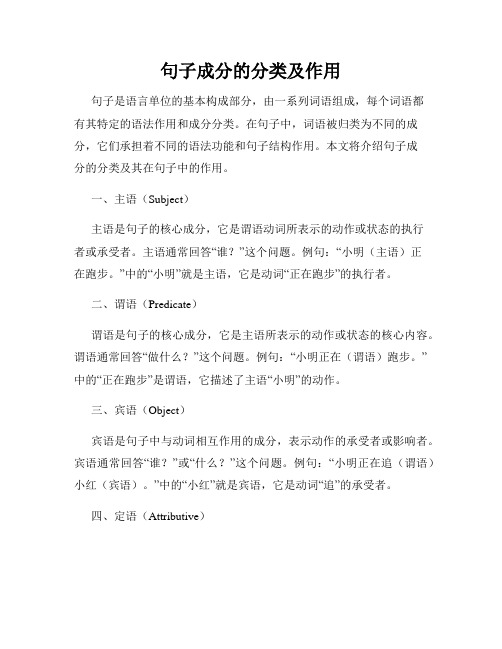
句子成分的分类及作用句子是语言单位的基本构成部分,由一系列词语组成,每个词语都有其特定的语法作用和成分分类。
在句子中,词语被归类为不同的成分,它们承担着不同的语法功能和句子结构作用。
本文将介绍句子成分的分类及其在句子中的作用。
一、主语(Subject)主语是句子的核心成分,它是谓语动词所表示的动作或状态的执行者或承受者。
主语通常回答“谁?”这个问题。
例句:“小明(主语)正在跑步。
”中的“小明”就是主语,它是动词“正在跑步”的执行者。
二、谓语(Predicate)谓语是句子的核心成分,它是主语所表示的动作或状态的核心内容。
谓语通常回答“做什么?”这个问题。
例句:“小明正在(谓语)跑步。
”中的“正在跑步”是谓语,它描述了主语“小明”的动作。
三、宾语(Object)宾语是句子中与动词相互作用的成分,表示动作的承受者或影响者。
宾语通常回答“谁?”或“什么?”这个问题。
例句:“小明正在追(谓语)小红(宾语)。
”中的“小红”就是宾语,它是动词“追”的承受者。
四、定语(Attributive)定语是用来修饰名词或代词的成分,它可以增添对名词的描述、限定和补充。
定语通常出现在名词的前面或后面。
例句:“我有一本(定语)有趣的(定语)书。
”中的“有趣的”就是定语,它修饰了名词“书”。
五、状语(Adverbial)状语是对动词、形容词、其他副词或整个句子进行修饰的成分,用于说明动作发生的时间、地点、方式、程度等。
状语可以放在句子的任何位置。
例句:“他昨天(状语)很快(状语)地(状语)跑完了(状语)整个马拉松。
”中的“昨天”、“很快地”和“跑完了整个马拉松”都是状语。
六、补语(Complement)补语是为了完善谓语动词的意思而添加的成分,用来对主语或宾语进行说明、补充或限定。
补语通常出现在系动词后面,用于补充系动词的意义。
例句:“这个苹果看起来(系动词)熟了(补语)。
”,中的“熟了”就是补语,它完善了系动词“看起来”的意思。
(完整)英语句子成分讲解(详细)
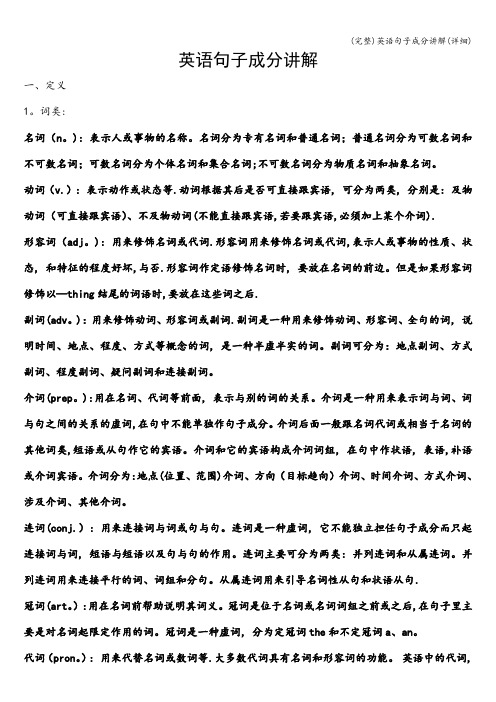
英语句子成分讲解一、定义1。
词类:名词(n。
): 表示人或事物的名称。
名词分为专有名词和普通名词;普通名词分为可数名词和不可数名词;可数名词分为个体名词和集合名词;不可数名词分为物质名词和抽象名词。
动词(v.): 表示动作或状态等.动词根据其后是否可直接跟宾语, 可分为两类, 分别是: 及物动词(可直接跟宾语)、不及物动词(不能直接跟宾语,若要跟宾语,必须加上某个介词).形容词(adj。
): 用来修饰名词或代词.形容词用来修饰名词或代词,表示人或事物的性质、状态, 和特征的程度好坏,与否.形容词作定语修饰名词时, 要放在名词的前边。
但是如果形容词修饰以—thing结尾的词语时,要放在这些词之后.副词(adv。
):用来修饰动词、形容词或副词.副词是一种用来修饰动词、形容词、全句的词, 说明时间、地点、程度、方式等概念的词, 是一种半虚半实的词。
副词可分为:地点副词、方式副词、程度副词、疑问副词和连接副词。
介词(prep。
):用在名词、代词等前面, 表示与别的词的关系。
介词是一种用来表示词与词、词与句之间的关系的虚词,在句中不能单独作句子成分。
介词后面一般跟名词代词或相当于名词的其他词类,短语或从句作它的宾语。
介词和它的宾语构成介词词组, 在句中作状语, 表语,补语或介词宾语。
介词分为:地点(位置、范围)介词、方向(目标趋向)介词、时间介词、方式介词、涉及介词、其他介词。
连词(conj.): 用来连接词与词或句与句。
连词是一种虚词, 它不能独立担任句子成分而只起连接词与词, 短语与短语以及句与句的作用。
连词主要可分为两类: 并列连词和从属连词。
并列连词用来连接平行的词、词组和分句。
从属连词用来引导名词性从句和状语从句.冠词(art。
):用在名词前帮助说明其词义。
冠词是位于名词或名词词组之前或之后,在句子里主要是对名词起限定作用的词。
冠词是一种虚词, 分为定冠词the和不定冠词a、an。
代词(pron。
英语中句子的类型

英语中句子的类型[摘要]英语句子的结构对英语学习非常的重要,句子结构掌握得好坏还直接影响到阅读的速度及对文章的理解,本文对英语句子从不同的标准进行了细致的划分。
[关键词]用途结构从句系动词句子是一个相对完整的概念,它有一定的语法和语调,英语中的句子根据不同的标准可以划分为以下几种类型:一、从用途来看,句子主要分为陈述句、疑问句、祈使句、感叹句四大类(一)陈述句用于陈述事实,句末标点一般用句号。
(二)疑问句用以提出问题,句末标点一般用问号。
疑问句可分为以下四种:1.一般疑问句以助动词do(did does)、be(am/is/are/was/were)、have(has、had)情态动词(can/may/must/shall/will……)开始,语调为升调,通常以yes或no回答。
2.一般疑问句以一个特殊疑问代词(what/which/who/whom)和特殊疑问副词(when/where/why/how)引入,语调为降调。
3.选择疑问句形式上与一般疑问句相似,但里面给出两个答案,由回答人选择,语调先升后降,不用yes或no回答。
4.反意疑问句由两部分组成,前一部分为陈述句,加逗号;后一部分为相应的简短问句,用问号。
前一部分肯定形式,后一部分通常用否定形式:否则相反。
语调先降后升。
(三)祈使句表示请求命令,又叫无人称句,但句子隐含主语是第二人称,句末标点用句号或感叹号。
(四)感叹句表示各种强烈的感情,由what, how引出句末用感叹号或问号。
二、从结构看,句子主要分为简单句、并列句、复合句、并列复合句四类(一)简单句简单句的五大基本句型:1.主语+谓语(不及物动词)2.主语+谓语(及物动词)+宾语3.主语+系动词+表语4.主语+谓语+间接宾语+直接宾语(1)间接宾语表示动作的接受者,直接宾语是动作的作用对象,如果把直接宾语放在间接宾语之前,则需要在间接宾语之前加相应的介词to或for.(2)双宾语的被动语态。
第三讲英语句子的功能分类(1).

第三讲英语句子的功能分类按照交际功能 1,英语句子大致可以分为四类:陈述句(declarative sentences 、疑问句 (interrogative sentences 、祈使句 (imperative sentences 和感叹句 (exclamatory sentences 。
这一讲我们将主要复习这些句子类型的结构特点及其使用语境。
(第23页一、英语中的陈述句顾名思义,陈述句主要是用来陈述事实,传递信息,提供情况。
(23页3.1:Declarative sentences are used to describe some state of affairs, to introduce some properties or features, or to portray some action.陈述句可以有肯定和否定两种形式。
如:23页:(一 Jack is in school.Grammar can be interesting.We ’ re having grammar class.(二I didn’ t tell him anything.He never smokes cigarette.I hardly know the people there.She scarcely spoke to him.No students will take the course.Nobody will agree to this project.I can do nothing about it.(三 That will be, I think, too much for him.You ’ ll be caught in the rain, I’ m afraid.I ’ ll have another cup, if you please.If you don’ t mind, I’ d like to think about it for a minute.He might be right.She seems to be unhappy.He appears to have many friends here.二、英语中的疑问句疑问句的主要交际功能是提出问题和询问情况,分为一般疑问句(simple questions 、特殊疑问句 (Wh-questions 、选择疑问句 (alternative questions 、反意疑问句 (tag questions 。
英语语法-句子的种类(史上最详细)

(4) 现在完成时和过去完成时的一般疑问句。 将助动词 have/has /had提至句首。 You have known her since your childhood? Have you known her since your childhood? 你从童年时就认识她吗? Yes I have /No I haven’t He had learned English before he came here? Had he learned English before he came here? 他来这之前就学过英语吗? Yes he had / No he hadn’t.
2.感叹句的种类
感叹句一般用what 或how开头,其具体用法如下:
(1) what引导的感叹句 (中心词是名词)
①What +a/an+ 形容词+可数名词单数(+主语+谓语)!
What a cold day (it is) !
多么冷的一天啊!
What a clever boy (he is)! 多么聪明的男孩!
句子的种类
英语的句子按照用途可分为四类:陈述句、疑问句、祈使 句和感叹句。
(一)陈述句
用来陈述一件事实或表达说话者看法的句子叫作陈述句, 句末用句号表示句子的陈述结束。陈述句分为肯定句和否 定句。 I like apples. 我喜欢苹果。 Tom is not good at English. 汤姆英语学得不好。
(2) 情态动词的一般疑问句。 陈述句中有情态动词,直接将情态动词提至主语前。 You can bring me some bread. Can you bring me some bread? Yes I can / No I can’t I must do it now. Must I do it now? Yes you must / No you need not.
英语基础体系教程(精)-第3章 英语句子四大功能和五大结构

4. 并列复合句(Compound Complex Sentence) (1) 复合句 + 简单句: e.g. Say you are sorry, and I’ll forgive you.你道歉,我就原谅你。 (2) 复合句 + 复合句: e.g. You may ask him to help if you like, but I think you had better do it yourself. 如果你愿意你可以找他帮忙,但我认为你最好还是自己来做。
20
独立主格结构:
一旦分词短语的逻辑主语和主句中的主语不一致时,就可能带上 自己的逻辑主语,于是就成了独立主格结构。独立主格结构本身不是 句子,在句子中作状语,表示时间、原因、条件、伴随、目的等。 (独立主格结构存在的原因:根据英语构句原则,如果两个句子之间 要使用逗号连接,中间就需要连词来连接,如果没有连词就只能牺牲 一个句子让其谓语变成非谓语结构,于是这整个句子就变成了独立主 格结构。)
句意:—你是打算去借一本字典还是杂志呢? —字典。
34
2. He seldom has lunch at school, ________?
A. hasn’t he
B. has he
C. do
解析:本题选D。考查反意疑问句,当陈述部分含有no,few, never,seldom,hardly,little,nowhere, nothing等否定意 义的词时,反意疑问部分用肯定形式提问,用什么提问由句子谓 语动词的形式决定,该句谓语动词为实义动词has,has lunch 表 示“吃午餐”,时态为一般现在时,这时候要用助动词do来提 问,这里主语为第三人称单数he,所以用助动词does。
英语句子按功能分类讲解(课堂PPT)

8
• 3) 祁使句(Imperative Sentence)
• 祈使句往往是用来表示说话人的请求、命令、要求、建议,等等。祈使句的 主语常被省略,因为这个主语很明确地是听话人"you"。当然,有时为了强
5
• B) 特殊疑问句(Special Question) • 特殊疑问句是对某件事或某种情况的某一方面的具体内容提问,因此,对哪
一方面的具体内容提问,就需要使用相应的特殊疑问词如:时间(When)、 地点(Where)、原因(Why)、方式(How)、人物(Who)、名称 (What),等等。另外,回答的内容也应该是具体的。例如: • --Who is in charge of English in your class ? --Zheng Zheng (is ). • --谁是你们班的英语科代表?--(是)郑征。 --Why is Luo Huimin absent from duty today .--She is preparing for going abroad . • 罗慧敏今天为什么没有上班?她要出国,正在做准备
调或表示某种感情,句子也会带上主语。祈使句的谓语用动词原形;它的否 定形式是句首用Don't + 动词原形,或是Not to + 动词原形。例如:
• Be quiet , please !
Don't smoke in the office .
• Don't be standing in the rain . Stand up !
英语的句子功能分类

英语的句子功能分类通常,我们可以从两个不同的角度对句子进行分类:一是按句子的用途;二是按句子的结构。
1.句子的用途分类所谓用途分类是指,根据句子的意思,句子的语言功能和作用是什么,然后将其归类。
按这种方法,所有的英语句子可以分成四个种类:陈述句(Declarative Sentence),疑问句(Interrogative Sentence),祈使句(Imperative Sentence)和感叹句(Exclamatory Sentence)。
1)陈述句(Declarative Sentence)陈述句是用来说明事实、看法,描述动作、状态,阐明道理、原因,等等。
这是日常生活中见得最多的一种句子。
它在表达意思上有两种形式,即肯定句形式和否定句形式。
例如:Chinese is one of the major languages in the world.中文是世界主要语言之一。
It is not an easy job to learn English well .学好英语不是件易事。
She is doing her term pa-pe-r .她在写学期论文。
This is a beautiful garden .这是一座漂亮的花园。
Wealth does not mean happine.富有并不意味着幸福。
Being over-slept, he was late for clatoday.由于睡过了头,他今天上课迟到了。
2)疑问句(Interrogative Sentence)疑问句是用来提出问题的,按其所提出的不同问题可分为以下四种:A)一般疑问句(General Question)一般疑问句是就某件事或某种情况的”是与否”提问。
因此,它的回答不是”Yes”就是”No”;回答时所用的句子可以是完整句,也可以是省略句。
另一方面,凡是疑问句一般说来都应该是倒装语序。
例如:--Are you a student ? --Yes, I am a student .--Do you like dancing ? --Yes, I do .B)特殊疑问句(Special Question)特殊疑问句是对某件事或某种情况的某一方面的具体内容提问,因此,对哪一方面的具体内容提问,就需要使用相应的特殊疑问词如:时间(When)、地点(Where)、原因(Why)、方式(How)、人物(Who)、名称(What),等等。
英语句子种类与类型

2、疑问句 (Interrogative sentence)
I
有一般疑问句、特殊疑问句、选择疑问句、
反义疑问句。
、 句
1)一般疑问句 (General Questions)
子 种
以情态动词,助动词或系动词Be开头的疑问句。 类
用来询问一件事,答案通常是yes或 no,注意语序。
句 子
7、目的(so that,in order that,in case) ;
类 型
8、条件(if,unless) ;
9、让步(though,although,even if,even though,in spite of the fact that ,whenever,wherever,whoever,whichever,
However,no matter how,whether) 。
3、复合句
并列复合句 即并列连词连接了带
从句的并列句。
二
、
English is widely used in the world, but China 句
has the largest number of people who speak 子
The man dressed in black seems to be a spy.
2、并列句 包含两个或更多互不依从的主谓
结构,分句由并列连词and,then,but,or,or
else,so,for,while,when;both…and,either
…or,neither…nor,not only…,but also,as
用来表达命令、要求、请求、劝告等。说话的对象 是第二人称时,you经常被省略。句末用句号或者叹号。
英语句子结构语法 详细分类
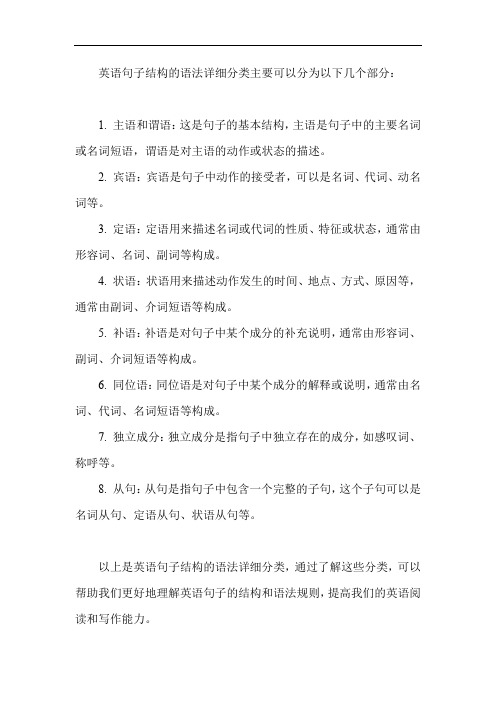
英语句子结构的语法详细分类主要可以分为以下几个部分:
1. 主语和谓语:这是句子的基本结构,主语是句子中的主要名词或名词短语,谓语是对主语的动作或状态的描述。
2. 宾语:宾语是句子中动作的接受者,可以是名词、代词、动名词等。
3. 定语:定语用来描述名词或代词的性质、特征或状态,通常由形容词、名词、副词等构成。
4. 状语:状语用来描述动作发生的时间、地点、方式、原因等,通常由副词、介词短语等构成。
5. 补语:补语是对句子中某个成分的补充说明,通常由形容词、副词、介词短语等构成。
6. 同位语:同位语是对句子中某个成分的解释或说明,通常由名词、代词、名词短语等构成。
7. 独立成分:独立成分是指句子中独立存在的成分,如感叹词、称呼等。
8. 从句:从句是指句子中包含一个完整的子句,这个子句可以是名词从句、定语从句、状语从句等。
以上是英语句子结构的语法详细分类,通过了解这些分类,可以帮助我们更好地理解英语句子的结构和语法规则,提高我们的英语阅读和写作能力。
【高中英语语法】 英语中句子种类的划分

补充内容:英语中句子种类的划分一般情况下,我们可以从两个不同的角度对句子进行分类:一是按句子的结构,可以分为简单句、并列句和主从复合句(从句);二是按句子的用途,一个简单句可分为陈述句、疑问句、祈使句和感叹句。
句子分类一览表句式定义例子简单句陈述句用来说明事实或说话人的看法,包括肯定句和否定句。
She is a doctor.She doesn’t like cats.疑问句一般疑问句一般指用Yes或No回答的疑问句。
Do you like maths?特殊疑问句是以疑问词开头的疑问句。
What day is it today?选择疑问句提出两种或两种以上的情况,要求对方选择一种。
Do you like drinking tea orcoffee?反意疑问句对陈述句所叙述的事实提出的疑问。
They went out, didn’t they?祈使句用来表示请求、命令。
Be quiet!Don’t play with fire.感叹句用来表达强烈的感情。
What a fine day it is!How interesting the book is!并列句含有两个或两个以上相互并列主谓结构的句子,各分句之间靠连词和分号等来连接。
表递进and, neither...nor, notonly...but also, as well as...表转折but, still, however, yet, while...表选择or, either...or, whether...or,otherwise...表因果so, for...主从复合句(以后详细讲解)由一个或一个以上的从句构成,主句为句子的主体,从句不能独立,只用作句子的一个成分.形容词性从句(定语从句)名词性从句(主宾表同)副词性从句(状语从句)初级篇:简单句和⼗⼤词性1、陈述句:出题一般考查的是将肯定句变为否定句。
有以下几种常见情况:谓语动词部分有be 动词、助动词(have/has/had )、情态动词(can/must/should 等)直接在其后面加notShe is a singer. → She is not a singer.I have found my schoolbag.→I have not found myschoolbag. 谓语动词为实义动词时(如hit, eat 等),变否定句需要添加助动词do/does/did ,在其后加notThey like jogging.→ They don’t like jogging. 句中含有all ,both 的句子,变完全否定时,要将all 变为none, both 变为neither, both…and…变为neither…nor…要注意谓语动词的变化。
高中英语知识点归纳句子成分的分类和功能
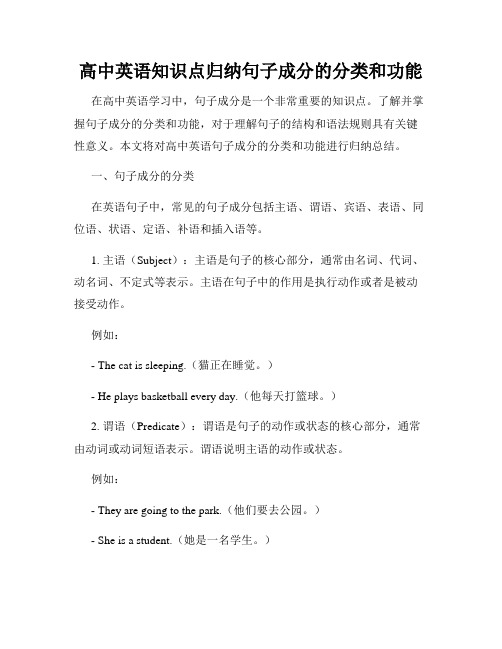
高中英语知识点归纳句子成分的分类和功能在高中英语学习中,句子成分是一个非常重要的知识点。
了解并掌握句子成分的分类和功能,对于理解句子的结构和语法规则具有关键性意义。
本文将对高中英语句子成分的分类和功能进行归纳总结。
一、句子成分的分类在英语句子中,常见的句子成分包括主语、谓语、宾语、表语、同位语、状语、定语、补语和插入语等。
1. 主语(Subject):主语是句子的核心部分,通常由名词、代词、动名词、不定式等表示。
主语在句子中的作用是执行动作或者是被动接受动作。
例如:- The cat is sleeping.(猫正在睡觉。
)- He plays basketball every day.(他每天打篮球。
)2. 谓语(Predicate):谓语是句子的动作或状态的核心部分,通常由动词或动词短语表示。
谓语说明主语的动作或状态。
例如:- They are going to the park.(他们要去公园。
)- She is a student.(她是一名学生。
)3. 宾语(Object):宾语是句子中动作的承受者或影响者,通常由名词、代词、动名词、不定式等表示。
宾语通常回答“谁”或“什么”的问题。
例如:- He bought a new car.(他买了一辆新车。
)- Can you pass me the salt?(你能递给我盐吗?)4. 表语(Predicate complement):表语通常用来补充说明主语的身份、特征或状态,通常由形容词、名词、代词等表示。
表语用来对主语进行补充说明。
例如:- She is happy.(她很开心。
)- The book is interesting.(这本书很有趣。
)5. 同位语(Appositive):同位语通常用来对前面的名词或代词进行解释或补充说明,通常由名词、代词等表示。
同位语用来进一步说明前面的名词或代词。
例如:- My sister, a doctor, lives in New York.(我的姐姐,一名医生,住在纽约。
英语句子按功能分类讲解
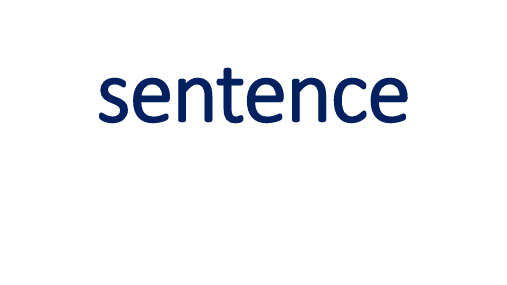
疑问部分
don’t _____ they ? • Everyone knows this , _____ did they • No one came , _______ _______? haven’t_____? they • Each of the boys has a football, ______ is it • None of the milk is left, ___ _____?
C) 选择疑问句(Alternative Question) 选择疑问句可以对句子中的任何成分设置选择问题,选择 部分由连词or连接。它貌似一般疑问句,其实两者有区别, 因为回答这种文句时既不能用"Yes"也不能用"No",而是 需要回答人说出具体的选择。另外,连词or之前的部分读 升调,其后的部分读降调。例如: --Is your sister or brother going abroad ? --My brother is . (选择主语)--是你的妹妹还是弟弟要出国?--我弟弟。 --Are you going to school or back home . --(I'm)Going home . (选择谓语) --你是去学校还是回家。--我回家。
These are books,are they?
something everything等 somebody everyone等
it
Nothing is serious, is it ? Everyone knows this,don’t they?/ doesn’t he?
they/he
陈述部分
4) 感叹句(Exclamatory Sentence) 感叹句表示说话人的喜悦、气愤、惊讶等强烈的情绪。 这类句子中,有很多是由What或How引起的。What 用来强调名词,How则强调形容词、副词或动词。这 类句子的构成只需将所强调或是说,所感叹的对象放 到句首;句子无需倒装,句子要用正常语序。 当然, 如果不用这种句型,而句子(无论是那种句子)本身 又表示了上述的种种情绪,那么该句也就成了感叹句。 例如: What a fine day it is today ! How fine it is today ! What a lovely son you have ! How lovely your son is !
英语句子的分类

英语句子的分类英语句子按其语法结构可以分为简单句、并列句和复合句三种类型。
1. 简单句(Simple Sentence):只有一个主谓结构的句子。
例如:1) Things change.2) Fire and water do not agree.3) He came into the classroom and sit down.2. 并列句(Compound Sentence):包含两个或两个以上互不依从的主谓结构的句子。
并列句的各个分句常用一定的并列连词(coordinating conjunction)(FAN BOYS)、连接副词(conjunctive adverbs)和分号(semicolon)连接在一起。
例如:1) I hate jogging, but I love hiking.2) Fishes must stay in water, or they will die.3) Punctuation is important; therefore, don’t forget to use a comma before the coordinating conjunction in a compound sentence.4) This is the best book I have ever read; it kept me up all night.3. 复合句(Complex Sentence):由一个主句(main clause)和至少一个从句(subordinate clause)构成的句子。
从句须用关联词(connective)引导,来表明与主句的关系。
例如:1) She loves her dog as a mother loves her child.2) Although many people were unknown to each other before, they have got acquainted with each other through e-mail.3) When you go for a job interview, it is important to create a good fist impression.4. 并列复合句(Compound-Complex Sentence),例如:1). Jack, who reads comics, rarely reads novels; however, Tom enjoysnovels.2). While the men worked to strengthen the dam, the rain continued to fall, and the river, which was already well above its normal level, rose higher and higher.。
英语写作知识:按功能分的句子种类有哪些?

英语写作知识:按功能分的句子种类有哪些?【名师优课】好消息!廖老师的新概念英语班级要开课了!廖老师的新概念英语课到底是什么样的呢?在《新概念英语》中,有关句子种类的知识,其实从第一册就有了。
只是与第二册直接在每个单元里列出不同的是,第一册并没有直接列出句子种类的知识。
然而,句子种类的知识对于英语学习来说是至关重要的,而对于写作来说则显得尤为重要。
为此,今天小编就给大家梳理梳理英语中常见的句子种类知识。
一、按照句子功能分如果按照句子在篇章中所起的功能或用途分,英语句子可以分为以下四种:(一)陈述句用来陈述事实或表达观点的句子。
可分为肯定句和否定句。
句末为句号。
如:The sun rises from the east. (陈述事实)I think English is very interesting. (表达观点)(二)疑问句用来提问的句子。
句末为问号。
分为一般疑问句、特殊疑问句、选择疑问句和反义疑问句。
1、一般疑问句用Yes/No来回答的疑问句。
如:Is she a college student?Yes, she is.No,she isn't.2、特殊疑问句以特殊疑问词开头的疑问句。
如:What's the climate like in your city?It'salways pleasant.3、选择疑问句用来提出两个或两个以上可能的答案供对方选择的疑问句。
如:Do you like tea or coffee?I like coffee.4、反义疑问句用来表示提问人的看法,没有把握,需要对方赞同的疑问句。
分为陈述和短问两个部分,一般遵循“前肯后否,前否后肯”的用法原则。
如:She comes from Japan, doesn'tshe?She has never visited the Great Wall,has she?(三)祈使句用来提出建议、命令、要求等的句子。
理解语法核心句子成分的分类与作用
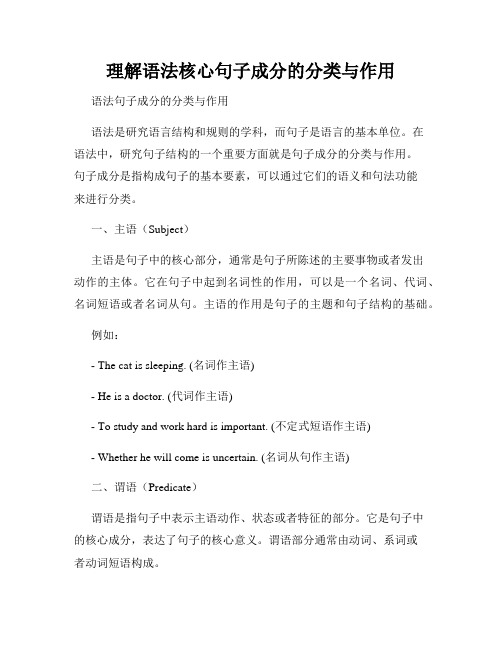
理解语法核心句子成分的分类与作用语法句子成分的分类与作用语法是研究语言结构和规则的学科,而句子是语言的基本单位。
在语法中,研究句子结构的一个重要方面就是句子成分的分类与作用。
句子成分是指构成句子的基本要素,可以通过它们的语义和句法功能来进行分类。
一、主语(Subject)主语是句子中的核心部分,通常是句子所陈述的主要事物或者发出动作的主体。
它在句子中起到名词性的作用,可以是一个名词、代词、名词短语或者名词从句。
主语的作用是句子的主题和句子结构的基础。
例如:- The cat is sleeping. (名词作主语)- He is a doctor. (代词作主语)- To study and work hard is important. (不定式短语作主语)- Whether he will come is uncertain. (名词从句作主语)二、谓语(Predicate)谓语是指句子中表示主语动作、状态或者特征的部分。
它是句子中的核心成分,表达了句子的核心意义。
谓语部分通常由动词、系词或者动词短语构成。
例如:- She runs every morning. (动词作谓语)- Richard is a teacher. (系词作谓语)- He has been studying for hours. (动词短语作谓语)三、宾语(Object)宾语是句子中与主语动作直接相关的名词、代词或者名词从句。
它通常接在及物动词后面,接受动作的影响。
宾语是句子成分中的重要补充部分,帮助完整表达动作。
例如:- She gave me a present. (名词作直接宾语)- John doesn't like it. (代词作直接宾语)- He asked whether I was going. (名词从句作宾语)四、定语(Adjective)定语是修饰名词或者代词的成分,用以限定或者描述名词的特征。
- 1、下载文档前请自行甄别文档内容的完整性,平台不提供额外的编辑、内容补充、找答案等附加服务。
- 2、"仅部分预览"的文档,不可在线预览部分如存在完整性等问题,可反馈申请退款(可完整预览的文档不适用该条件!)。
- 3、如文档侵犯您的权益,请联系客服反馈,我们会尽快为您处理(人工客服工作时间:9:00-18:30)。
第三讲英语句子的功能分类按照交际功能 1,英语句子大致可以分为四类:陈述句(declarative sentences 、疑问句 (interrogative sentences 、祈使句 (imperative sentences 和感叹句 (exclamatory sentences 。
这一讲我们将主要复习这些句子类型的结构特点及其使用语境。
(第23页一、英语中的陈述句顾名思义,陈述句主要是用来陈述事实,传递信息,提供情况。
(23页3.1:Declarative sentences are used to describe some state of affairs, to introduce some properties or features, or to portray some action.陈述句可以有肯定和否定两种形式。
如:23页:(一 Jack is in school.Grammar can be interesting.We ’ re having grammar class.(二I didn’ t tell him anything.He never smokes cigarette.I hardly know the people there.She scarcely spoke to him.No students will take the course.Nobody will agree to this project.I can do nothing about it.(三 That will be, I think, too much for him.You ’ ll be caught in the rain, I’ m af raid.I ’ ll have another cup, if you please.If you don’ t mind, I’ d like to think about it for a minute.He might be right.She seems to be unhappy.He appears to have many friends here.二、英语中的疑问句疑问句的主要交际功能是提出问题和询问情况,分为一般疑问句(simple questions 、特殊疑问句 (Wh-questions 、选择疑问句 (alternative questions 、反意疑问句 (tag questions 。
(一一般疑问句又叫作是非问句 (Yes-No questions , 通常用来询问求实某事 (如 24页:Is Jack at home now? 或者提出某种请求以实现某种行为(如 24页:Can you open the window, Jack? 。
请看下列例句,试转换为陈述句,体会一般疑问句的基本结构:Is his father an English teacher?Are those cats crying?Can they swim?Do you go to school on foot?1功能指事物或方法所发挥的有利的作用。
Does he like English?Is anybody in the classroom?Does the boy do some housework at home?Did the children have a good time in the park?Does Jim have any story-books?(二特殊疑问句用来获得具体信息。
常见的疑问词有:who, whom, what, which, when, where, why, how, how much, how many, how long, how old, how far, how big等。
请看下列例句,Who would like to go out for a walk?Which is mine?Which book is yours?Which one is suited for teaching?What do you read?Which book do you want?How did you get here?When did you arrive?Why did you do that?(实际提问(三选择疑问句提出两个或两个以上可能的答案供对方选择。
例如:Do you like to play football or basketball?2Shall we walk, or shall we go by bus?2like doing sth:like to do sth1.这两个短语动词的意境色彩稍有不同:like doing sth表达经常的爱好,相当于enjoy 的意思(注:美国英语使用 like to do sth也能表达这个意思 ; like to do sth是表达一时的喜爱, 相当于 choose to或 think it right 的意思。
如果加用了 would 或should ,后者的意义便更接近 wish 和 want 的意思了。
例如:The Spartans knew how to fight, and they liked fighting.斯巴达人懂得如何战斗,也喜爱战斗。
(说明他们习性如此The Spartans knew how to fight, and they liked to fight whenever occasion required.斯巴达人懂得如何战斗,而在必要时他们就挺身而出投入到战斗中去。
(表达一时的勇气比较:Do you like swimming?你是否爱好游泳?(是问爱好Would you like to go for a swimming this afternoon?今天下午你喜不喜欢出去游泳。
(是问一时的兴头I like taking a nap after lunch.午饭后我喜欢打个盹儿。
(似乎已成习惯。
I like to take a nap this afternoon.今天下午我想打个盹。
(是偶然一次。
2a .其次, like doing所表达的喜爱或爱好是他动的,而 like to do sth则是主动的。
比较:I like singing.我爱听唱歌。
(是别人唱。
I like to sing that song.我爱唱那首歌。
(是我自己唱 2b .如果用于否定结构,两者就没有主动和他动的区别了。
例如:I don't like asking for money except when I have to.除非万不得已,我不愿向人借钱。
I know she could help, but I don't like to ask her when she's so busy.我知道她能帮我的忙,但她正在忙着的时候,我不愿惊动她。
比较:We didn't like staking our all.我们不愿孤注一掷。
(用于否定句,与下一句同义We didn't like to stake our all.我们不愿孤注一掷。
(用于否定句,与上一句同义(问:在什么情况下,选择问句可以用 No 来回答?见课本第 24页。
(四反意疑问句又叫附加疑问句,通常用来向听话者证实某事,主要有两部分组成:陈述部分 +附加疑问部分。
附加疑问部分与叙述部分的主语所指必须一致, 指称同一人或事物, 但附加部分的主语要以人称代词的形式出现, 动词时态也要保持一致。
一般情况下, 这两部分是肯定与否定相对的。
请补出下列问句的附加部分:This is important, ________?These aren’ t his books, ________?3Everything is all right, ________?Nothing can stop us, ________?4Everybody knows this, ________?Nobody phoned while I was out, ________?No one wants to go, ________?5He is a teacher, ________?He can’ t swim, ________?6You ’ d better go now, ______?You ’ d rather go there early, ________?He ’ d like to go, ______?7We have to get there at eight tomorrow, ________?They had to take the early train, ________?8You had a letter from Australia, __________?He has some brothers, __________?9They must clean the floor after school, ________?(表示“必须”They mustn’ t take the book out of the library, may they?(表示“禁止”They must be playing football on the sports ground, aren’ t they?(表示“准是”You must have misheard, haven’ t you/ didn’ t you?You have told me that you were fond of swimming, weren’ t you?Tom told me that you were going to America, weren’ t you?What beautiful paintings, aren’ t they?3当陈述部分的主语是 this, that, these, those时,疑问部分的主语分别用 it 和they 。
4当陈述部分的主语是 everything, something, anything, nothing时,疑问部分的主语采用 it 。
5当陈述部分的主语是 everybody, everyone, somebody, someone, nobody, no one 等合成代词时,疑问部分的主语要采用 they ,有时用 he 。
